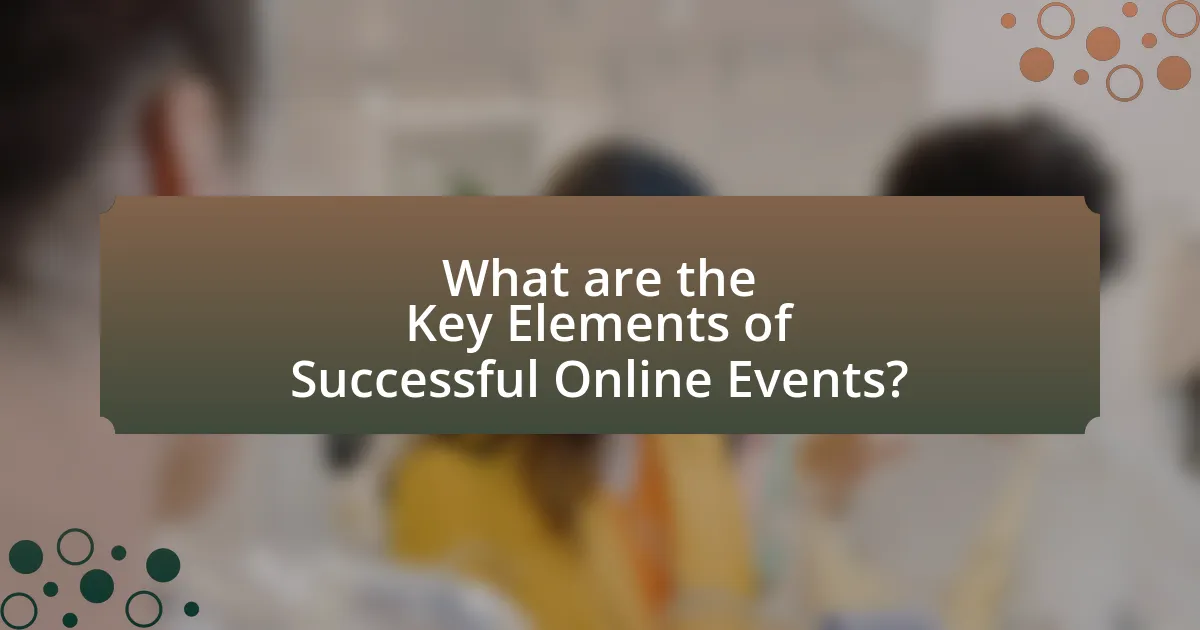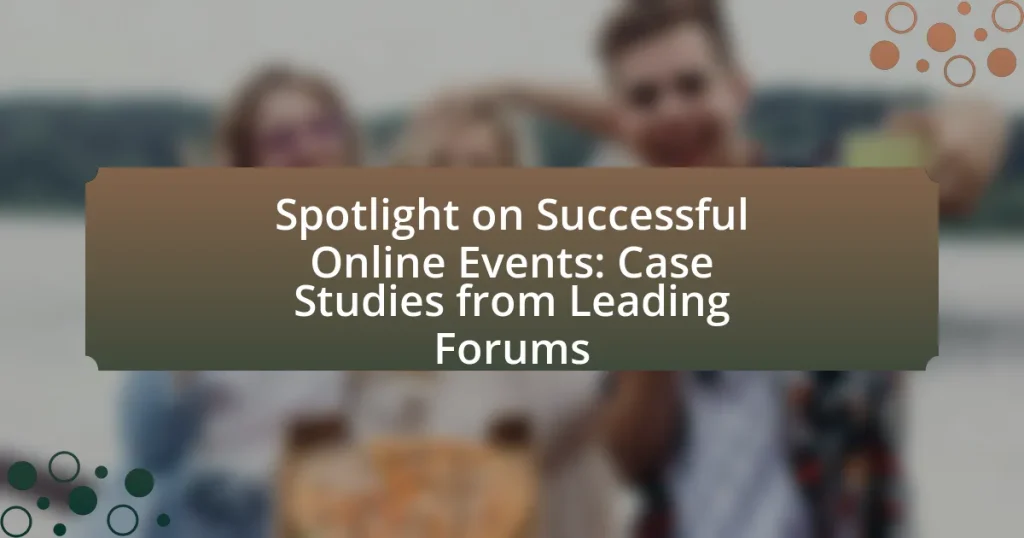The article focuses on successful online events, highlighting their characteristics, metrics for measuring success, and strategies for engagement. It defines success through participant satisfaction, engagement metrics, and achievement of objectives, emphasizing the importance of interactive elements and effective planning. Case studies from leading forums illustrate best practices and unique approaches across various industries, showcasing how tailored strategies enhance participant involvement and overall event effectiveness. Key elements such as clear objectives, engaging content, and reliable technology are discussed as essential for organizing impactful online events.

What are Successful Online Events?
Successful online events are virtual gatherings that effectively engage participants, achieve their intended objectives, and foster meaningful interactions. These events often utilize interactive features such as live polls, Q&A sessions, and breakout rooms to enhance participant involvement. For instance, a study by the Event Marketing Institute found that 73% of event marketers believe that interactive elements significantly improve attendee engagement. Successful online events also prioritize clear communication, well-defined agendas, and the use of reliable technology to ensure a seamless experience for all participants.
How do we define success in online events?
Success in online events is defined by measurable engagement metrics, participant satisfaction, and achievement of predefined objectives. Engagement metrics include attendance rates, interaction levels during the event, and post-event feedback, which collectively indicate how well the event captured and maintained participant interest. Participant satisfaction can be assessed through surveys and feedback forms, revealing how attendees perceived the value and quality of the event. Additionally, achieving predefined objectives, such as generating leads, increasing brand awareness, or fostering community interaction, serves as a concrete indicator of success. For instance, a study by Eventbrite found that 70% of event organizers consider attendee engagement as the primary measure of success, highlighting its significance in evaluating online events.
What metrics are used to measure success in online events?
Key metrics used to measure success in online events include attendance rates, engagement levels, participant feedback, and conversion rates. Attendance rates indicate the number of registered participants versus actual attendees, providing insight into the event’s reach. Engagement levels are assessed through metrics such as chat activity, poll participation, and social media interactions, reflecting how actively participants are involved. Participant feedback, often gathered through surveys, offers qualitative data on attendee satisfaction and areas for improvement. Conversion rates measure the effectiveness of the event in achieving specific goals, such as lead generation or sales, by tracking actions taken by attendees post-event. These metrics collectively provide a comprehensive view of an online event’s success.
How do participant engagement levels contribute to perceived success?
Participant engagement levels significantly contribute to perceived success by directly influencing the overall experience and outcomes of online events. High engagement levels often correlate with increased satisfaction, retention, and positive feedback from participants, which are critical indicators of success. For instance, a study by the Event Marketing Institute found that 84% of participants in highly engaging events reported a positive experience, leading to a higher likelihood of recommending the event to others. This demonstrates that when participants are actively involved, they perceive the event as more successful, enhancing its reputation and future attendance.
What types of online events are considered successful?
Successful online events typically include webinars, virtual conferences, and live-streamed workshops. These formats engage participants through interactive elements such as Q&A sessions, polls, and networking opportunities, which enhance attendee experience and retention. For instance, a study by the Event Marketing Institute found that 73% of marketers believe webinars are the best way to generate high-quality leads, demonstrating their effectiveness in achieving business objectives. Additionally, virtual conferences often report higher attendance rates compared to in-person events, with platforms like Zoom and Hopin facilitating seamless interactions among participants.
What are the characteristics of webinars that achieve high attendance?
Webinars that achieve high attendance typically feature engaging content, effective promotion, and optimal scheduling. Engaging content includes relevant topics that resonate with the target audience, often supported by expert speakers or interactive elements. Effective promotion utilizes multiple channels, such as email marketing, social media, and partnerships, to reach a wider audience. Optimal scheduling considers time zones and avoids conflicts with major events, maximizing potential attendance. Research indicates that webinars promoted through multiple platforms can increase attendance rates by up to 40%, demonstrating the importance of a comprehensive marketing strategy.
How do virtual conferences differ from other online events in terms of success?
Virtual conferences differ from other online events in terms of success primarily through their structured networking opportunities and interactive formats. Unlike webinars or simple live streams, virtual conferences often include features such as breakout sessions, Q&A panels, and virtual exhibit halls, which facilitate deeper engagement among participants. According to a study by Eventbrite, 70% of attendees at virtual conferences reported making valuable connections, compared to only 30% at standard online events. This enhanced networking capability significantly contributes to the perceived success of virtual conferences, as they foster community building and professional relationships that are often lacking in less interactive online formats.

What are the Key Elements of Successful Online Events?
The key elements of successful online events include clear objectives, engaging content, effective technology, audience interaction, and post-event follow-up. Clear objectives guide the event’s purpose and outcomes, ensuring that all activities align with desired goals. Engaging content captivates the audience, making use of multimedia and interactive elements to maintain interest. Effective technology is crucial for seamless delivery, including reliable platforms that support video, audio, and chat functionalities. Audience interaction fosters participation and connection, often through Q&A sessions, polls, or breakout rooms. Finally, post-event follow-up, such as surveys or additional resources, helps to reinforce learning and gather feedback for future improvements. These elements are supported by industry research indicating that events with high audience engagement and clear objectives see a 30% increase in participant satisfaction and retention rates.
How does effective planning contribute to the success of online events?
Effective planning is crucial for the success of online events as it ensures that all logistical, technical, and content-related aspects are meticulously organized. This structured approach minimizes potential disruptions, enhances participant engagement, and maximizes the overall impact of the event. For instance, a study by the Event Marketing Institute found that 70% of successful online events attributed their effectiveness to thorough pre-event planning, which included clear objectives, audience targeting, and technology checks. Such planning not only streamlines the execution process but also fosters a seamless experience for attendees, ultimately leading to higher satisfaction and retention rates.
What role does audience targeting play in event planning?
Audience targeting is crucial in event planning as it ensures that the event content and marketing strategies align with the interests and needs of the intended participants. By identifying specific demographics, preferences, and behaviors of the target audience, event planners can tailor the event experience to enhance engagement and satisfaction. For instance, a study by Eventbrite found that events with clearly defined target audiences see a 20% increase in attendance and participant satisfaction. This data underscores the importance of audience targeting in maximizing the effectiveness and success of an event.
How can technology enhance the planning process for online events?
Technology enhances the planning process for online events by providing tools that streamline organization, communication, and execution. Event management software allows planners to automate tasks such as registration, scheduling, and attendee tracking, which increases efficiency. For instance, platforms like Eventbrite and Zoom offer integrated solutions that facilitate real-time updates and notifications, ensuring all participants are informed and engaged. Additionally, data analytics tools enable planners to assess attendee behavior and preferences, allowing for tailored experiences that improve satisfaction and engagement. According to a report by Eventbrite, 80% of event organizers who use technology report increased attendee engagement, demonstrating the effectiveness of these tools in enhancing the planning process.
What strategies can be employed to engage participants during online events?
To engage participants during online events, interactive elements such as polls, Q&A sessions, and breakout rooms can be employed. These strategies encourage active participation and foster a sense of community among attendees. For instance, a study by the Virtual Events Institute found that events incorporating live polls saw a 30% increase in participant engagement compared to those that did not. Additionally, utilizing gamification techniques, such as leaderboards and rewards, can further enhance engagement by motivating participants to interact more actively.
How can interactive elements improve participant engagement?
Interactive elements significantly enhance participant engagement by fostering active participation and creating a dynamic environment. When participants can interact through polls, quizzes, or live Q&A sessions, they are more likely to feel involved and invested in the content being presented. Research indicates that events incorporating interactive features can increase audience retention rates by up to 60%, as participants are more likely to remember information when they actively engage with it. Additionally, interactive elements can facilitate real-time feedback, allowing organizers to adjust content and maintain audience interest, further solidifying the connection between engagement and interactive features.
What are the best practices for facilitating discussions in online forums?
The best practices for facilitating discussions in online forums include establishing clear guidelines, encouraging participation, and actively moderating conversations. Clear guidelines help set expectations for behavior and topics, which fosters a respectful environment. Encouraging participation can be achieved by asking open-ended questions and recognizing contributions, which motivates users to engage. Active moderation involves monitoring discussions to ensure adherence to guidelines and addressing any conflicts or inappropriate behavior promptly, which maintains a positive atmosphere. Research indicates that forums with structured moderation and clear rules see higher user satisfaction and engagement rates, as evidenced by studies conducted by the Pew Research Center on online community dynamics.

What Can We Learn from Case Studies of Leading Forums?
Case studies of leading forums reveal key insights into community engagement, user retention, and effective moderation strategies. For instance, the success of platforms like Reddit and Stack Overflow demonstrates that fostering a sense of belonging and encouraging user-generated content significantly enhances participation. Data shows that Reddit’s upvote system incentivizes quality contributions, leading to a vibrant community where users feel valued. Additionally, Stack Overflow’s structured Q&A format promotes knowledge sharing, resulting in high user retention rates, with over 50% of users returning to the site regularly. These examples illustrate that clear guidelines and active moderation are essential for maintaining a positive environment, ultimately driving the success of online forums.
What are some notable examples of successful online events?
Notable examples of successful online events include the 2020 virtual edition of the Coachella Valley Music and Arts Festival, which attracted over 75 million views, and the 2021 virtual Comic-Con, which featured panels with major studios and drew more than 500,000 attendees. These events demonstrated the ability to engage large audiences through innovative digital platforms, showcasing performances and interactive experiences that rivaled in-person attendance. The success of these events is evidenced by their high viewership numbers and participant engagement metrics, highlighting the effectiveness of online formats in reaching global audiences.
How did specific forums achieve high levels of engagement and participation?
Specific forums achieved high levels of engagement and participation through targeted community-building strategies and interactive content. For instance, forums like Reddit and Stack Overflow fostered engagement by implementing features such as upvoting, commenting, and gamification elements like badges and reputation scores, which incentivized user contributions. Additionally, these forums often hosted AMAs (Ask Me Anything) and live Q&A sessions with experts, significantly increasing user interaction and participation rates. Data from a 2021 study by the Pew Research Center indicated that forums with active moderation and clear community guidelines saw a 30% increase in user retention and participation, demonstrating the effectiveness of structured engagement strategies.
What lessons can be drawn from the challenges faced by these forums?
The challenges faced by online forums highlight the importance of adaptability and community engagement. Forums that struggled often did so due to a lack of responsiveness to user feedback, which is crucial for maintaining relevance and user satisfaction. For instance, forums that implemented regular surveys and actively incorporated user suggestions saw a marked increase in participation and retention rates. Additionally, the need for robust moderation emerged as a key lesson; forums that failed to manage conflicts or inappropriate content experienced significant declines in user trust and activity. These insights underscore the necessity for continuous improvement and proactive management in fostering vibrant online communities.
How do different industries approach online events?
Different industries approach online events by tailoring their strategies to meet specific audience needs and objectives. For instance, the technology sector often emphasizes product launches and demonstrations, utilizing platforms like Zoom and Webex to showcase innovations, as seen in events like Apple’s product unveilings. In contrast, the education sector focuses on webinars and virtual classrooms, leveraging tools such as Microsoft Teams and Google Classroom to facilitate interactive learning experiences, exemplified by the rapid shift to online learning during the COVID-19 pandemic. The healthcare industry prioritizes telehealth conferences and virtual patient engagement, utilizing platforms like Doxy.me to enhance accessibility and communication, as evidenced by the increase in telehealth usage by 154% in March 2020 compared to the previous year. Each industry adapts its online event format and technology to align with its unique goals and audience expectations.
What unique strategies do educational forums use for online events?
Educational forums employ unique strategies for online events, such as interactive workshops, gamification, and community-driven content creation. Interactive workshops allow participants to engage directly with experts, enhancing learning through real-time feedback and discussion. Gamification incorporates elements like quizzes and challenges to motivate participation and retention of information, making the learning experience more enjoyable. Community-driven content creation encourages users to contribute their insights and resources, fostering a sense of ownership and collaboration among participants. These strategies have been shown to increase engagement and satisfaction in online educational settings, as evidenced by studies indicating that interactive elements can boost retention rates by up to 60%.
How do corporate forums tailor their events for maximum impact?
Corporate forums tailor their events for maximum impact by focusing on audience engagement, relevant content, and strategic networking opportunities. They utilize data analytics to understand participant preferences and customize agendas that resonate with attendees’ interests. For instance, successful forums often incorporate interactive elements such as polls, Q&A sessions, and breakout discussions, which have been shown to enhance participant involvement and satisfaction. Additionally, they leverage technology to facilitate seamless communication and collaboration, ensuring that attendees can connect with industry leaders and peers effectively. This approach not only increases the perceived value of the event but also fosters lasting relationships among participants, ultimately driving better outcomes for both the attendees and the organizing entities.
What are the best practices for organizing successful online events?
The best practices for organizing successful online events include thorough planning, engaging content, effective promotion, and utilizing reliable technology. Thorough planning involves defining clear objectives, understanding the target audience, and creating a detailed agenda. Engaging content is crucial; it should be interactive and relevant to maintain participant interest. Effective promotion through various channels, such as social media and email marketing, ensures a wider reach and higher attendance. Utilizing reliable technology, including user-friendly platforms and tools for interaction, minimizes technical issues and enhances the overall experience. These practices are supported by studies indicating that well-planned and executed online events can achieve up to 70% higher engagement rates compared to poorly organized ones.
How can organizers ensure a seamless technical experience for participants?
Organizers can ensure a seamless technical experience for participants by conducting thorough pre-event testing of all technology and platforms used. This includes checking internet connectivity, audio and video quality, and the functionality of interactive features like polls and Q&A sessions. A study by the Event Leadership Institute found that 70% of technical issues can be mitigated through comprehensive testing and rehearsal, which highlights the importance of preparation. Additionally, providing clear instructions and support resources for participants can further enhance their experience, as evidenced by successful online events that prioritize user-friendly interfaces and accessible help options.
What tips can help in promoting online events effectively?
To promote online events effectively, utilize targeted social media advertising to reach specific demographics. Research indicates that 73% of marketers believe that social media marketing has been effective for their business, highlighting its importance in event promotion. Additionally, creating engaging content such as videos and infographics can capture audience interest, as visual content is known to increase engagement rates by up to 80%. Email marketing remains a powerful tool, with studies showing that for every $1 spent, email marketing generates $42 in return on investment. Lastly, leveraging partnerships with influencers or industry leaders can expand reach, as 49% of consumers depend on influencer recommendations.
